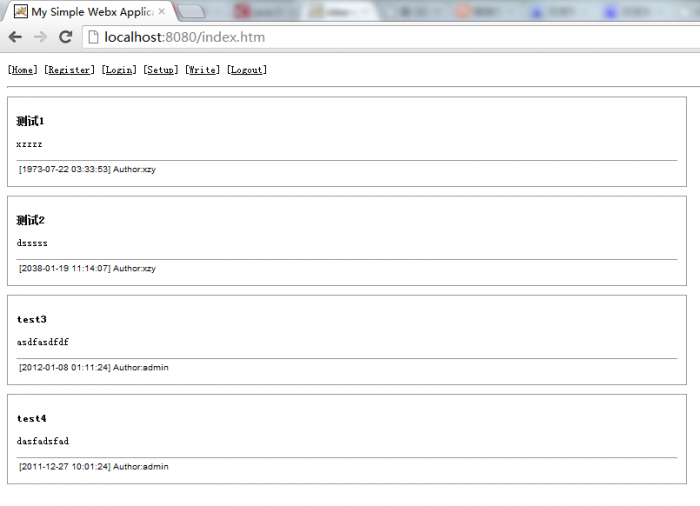记录些今天倒腾的东西
1、 搜索maven库,搜索出自己想要的库的groupid等信息
2、 spring下面整合memcache
memcache的java客户端选用的是xmemcache,可以在maven中心库中直接搜索到并使用
[codesyntax lang=”xml”]
<bean name="memcachedClient" class="net.rubyeye.xmemcached.utils.XMemcachedClientFactoryBean"> <property name="servers"> <value>127.0.0.1:11211</value> </property> </bean>
[/codesyntax]
这样就可以在程序中使用MemcachedClient连接类了
[codesyntax lang=”java”]
public class Index {
@Autowired
private MemcachedClient memcachedClient;
public void execute(Context context) {
try {
WebSiteDO web = new WebSiteDO();
memcachedClient.set("test111", 30, web);
WebSiteDO webCache = memcachedClient.get("test111");
System.out.println(webCache.getImagesPath());
} catch (TimeoutException e) {
// TODO Auto-generated catch block
e.printStackTrace();
} catch (InterruptedException e) {
// TODO Auto-generated catch block
e.printStackTrace();
} catch (MemcachedException e) {
// TODO Auto-generated catch block
e.printStackTrace();
}
}
}
[/codesyntax]
3、webx中使用memcache来存储session
修改webx.xml中的session部分
[codesyntax lang=”xml”]
<session>
<id>
<cookie path="/" maxAge="2048" httpOnly="true" />
</id>
<stores>
<session-stores:store id="simple" class="cn.yundev.xzy.common.MemCacheSession"/>
</stores>
<store-mappings>
<match name="*" store="simple" />
</store-mappings>
</session>
[/codesyntax]
扩展session只需要继承接口SessionStore接口
[codesyntax lang=”java”]
public class MemCacheSession implements SessionStore {
private MemcachedClient memcachedClient;
public void init(String storeName, SessionConfig sessionConfig) throws Exception {
ApplicationContext atx = new ClassPathXmlApplicationContext("xmemcache.xml");
memcachedClient = (MemcachedClient) atx.getBean("memcachedClient");
}
public Iterable<String> getAttributeNames(String sessionID,
StoreContext storeContext) {
try {
SessionDO session = memcachedClient.get(sessionID);
if (session == null) {
return emptyList();
} else {
return session.getSessionData().keySet();
}
} catch (TimeoutException e) {
e.printStackTrace();
} catch (InterruptedException e) {
e.printStackTrace();
} catch (MemcachedException e) {
e.printStackTrace();
}
return null;
}
public Object loadAttribute(String attrName, String sessionID,
StoreContext storeContext) {
try {
SessionDO session = memcachedClient.get(sessionID);
if (session != null) {
Map<String, Object> sessionData = session.getSessionData();
return sessionData.get(attrName);
}
} catch (TimeoutException e) {
e.printStackTrace();
} catch (InterruptedException e) {
e.printStackTrace();
} catch (MemcachedException e) {
e.printStackTrace();
}
return null;
}
public void invaldiate(String sessionID, StoreContext storeContext) {
try {
memcachedClient.delete(sessionID);
} catch (TimeoutException e) {
e.printStackTrace();
} catch (InterruptedException e) {
e.printStackTrace();
} catch (MemcachedException e) {
e.printStackTrace();
}
}
public void commit(Map<String, Object> attrs, String sessionID,
StoreContext storeContext) {
Map<String, Object> sessionData = new HashMap<String, Object>();
try {
SessionDO session = memcachedClient.get(sessionID);
if (session != null) {
sessionData = session.getSessionData();
}
for (Map.Entry<String, Object> entry : attrs.entrySet()) {
String attrName = entry.getKey();
Object attrValue = entry.getValue();
if (attrValue == null) {
sessionData.remove(attrName);
} else {
sessionData.put(attrName, attrValue);
}
}
SessionDO sessionDO = new SessionDO();
sessionDO.setSessionData(sessionData);
boolean r = memcachedClient.set(sessionID, 1200, sessionDO);
System.out.println(r);
} catch (TimeoutException e) {
e.printStackTrace();
} catch (InterruptedException e) {
e.printStackTrace();
} catch (MemcachedException e) {
e.printStackTrace();
}
}
}
[/codesyntax]
